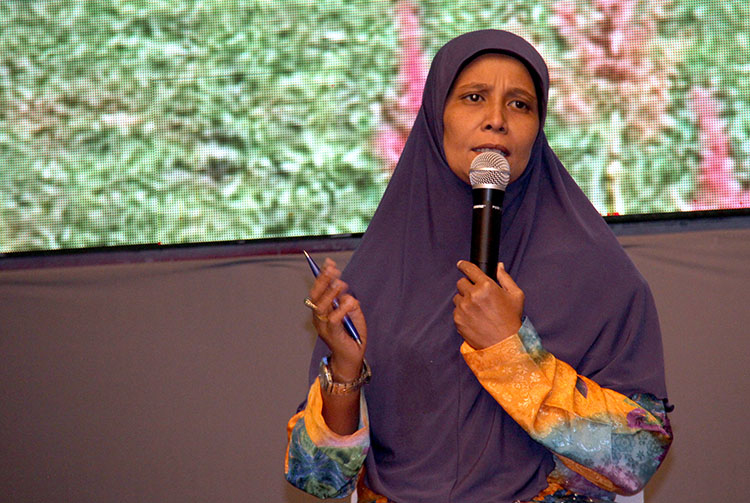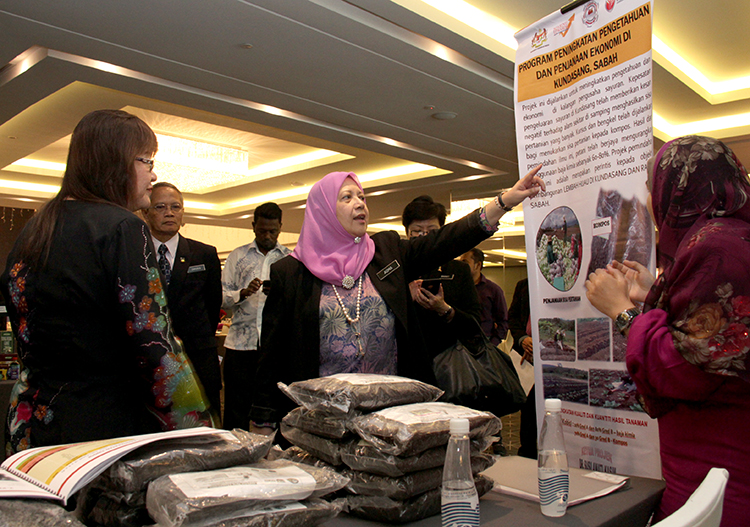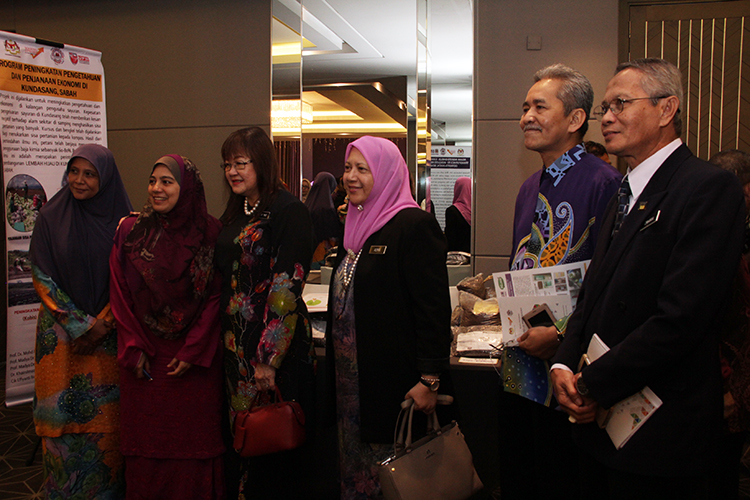SUSTAINING KNOWLEDGE TRANSFER ACTIVITIES THROUGH ACHIEVEMENTS IN COLLABORATIVE RESEARCH OUTCOMES

PENANG, 1 December 2016 - The Knowledge Transfer Programme which was implemented with allocations from the 10th Malaysia Plan has succeeded in producing 459 projects, with the involvement of 1,698 academicians of various knowledge disciplines, 875 graduate interns, 275 industry partners and 184 communities.
The next hurdle would be on how to sustain those efforts to benefit society, following those which had been done in meeting the needs of local communities.
According to a lecturer from Universiti Putra Malaysia (UPM), Dr. Susilawati binti Kasim, this issue requires a long-term review and is a major challenge after gaining the trust and transforming the local communities by dealing with their problems collectively.

Together with her colleagues from the academia, they had implemented a project called 'Program Peningkatan Pengetahuan Pengusaha Sayuran dan Penjanaan Ekonomi di Kawasan Kundasang Sabah', to provide knowledge to vegetable farmers in Kundasang, Sabah towards income generation.
"At the initial stage of the project, we needed to gain the trust of the locals, who were used to farming vegetables using fertilizers and weedkillers without any proper knowledge and regulation, including in the use of subsidised fertilizers which were not meant for vegetables, practices that were harmful to their health and the environment, and indirectly causing flies to multilpy due to the farmers dumping their vegetable waste in the area," she said during the sharing session on experiences of the university-industry-community as part of the programme at the Third National Conference on Knowledge Transfer 2016.
She and her colleagues also brought the farmers from Kundasang to Cameron Highlands to see the success of the local farmers, and to convince them on the farming of various produces and the means of dealing with problems through proper farm management practices.
"This was not easy to do, more so in finding solutions to problems of local farming practices, which was highly-dependent on chemical fertilizers and which was offered a substitute by producing semi-organic and mineral organic fertilizers, using local ingredients and teaching them on ways of dealing with farming methods and the managing of diseases and the land in a more effective and sustainable manner," she said.
As a result, they had succeeded in educating the farmers to use 80% organic fertilizers with greater yield, better land management, solved the problem of flies and lowered the costs in their efforts.
"Even today, there are among them who have become entrepreneurs, producing organic fertilizers with local contents for other farmers to manage their produce," she said.
Susilawati stressed that, this is one example where academicians were able to use their knowledge on the ground, to solve local problems and the next step would be to expand this effort and to ensure a programme such as this could be sustained in the long run, what more with their hope of creating the 'Green Valley' in Kundasang.
Others who also shared their success were the Research Executive from Bukit Merah Arowana Farm Sdn. Bhd. who worked with experts from Universiti Malaysia Terengganu (UMT) on the project of increasing the production of arowanas through genetics approach; Senior Fellow of Universiti Tun Hussein Onn Malaysia (UTHM), Dr. Ng Kim Soon who shared his collaborative experience working with Miaow Miaow Food Products Sdn Bhd, to raise the quality in food frying and maximising the use of cooking oil and avoiding any chemical side-effects of the fried food; Manager of Corporate Relations, Pertubuhan Peladang Kawasan Johor Baharu Selatan, Norhuraiza Md. Kena who was involved in raising the production of fish by using microalgae and copepod live feed for initial diet with the expertise from UMT; and an archaeo-tourism services operator from Sg. Batu in Kedah, Mohd. Faiz Abu Mansor who has benefitted from the knowledge transfer programme on the archaeological research project at the Sg. Batu site headed by the Director, USM Centre for Global Archaeological Research (CGAR), Professor Dato' Dr. Mokhtar Saidin.
Translation: Mazlan Hanafi Basharudin
- Created on .
- Hits: 1525

